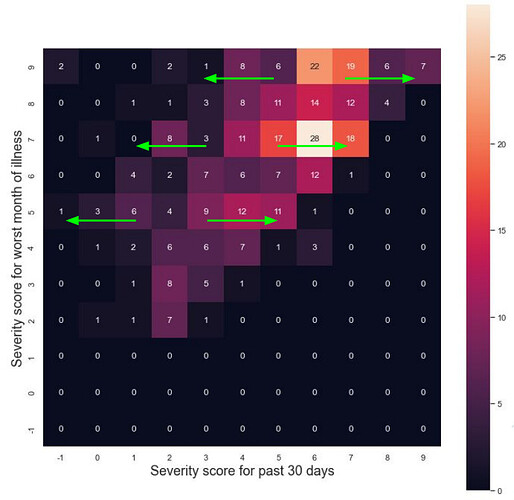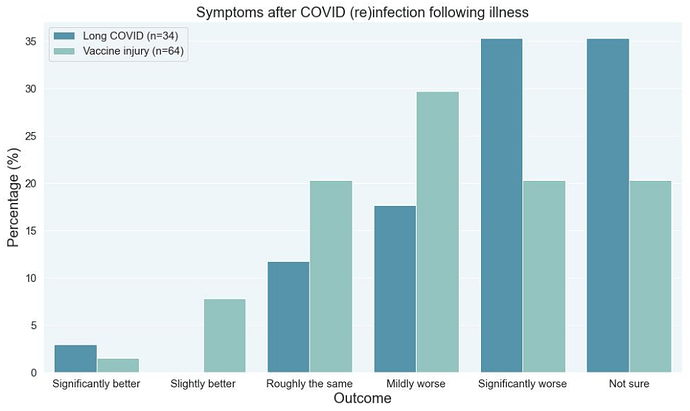What I’m seeing in the data is that recovery and worsening exists along a spectrum. It’s not a binary thing where you either have chronic illness or you don’t. People have varying degrees of chronic illness, ranging from mild to the worst suffering imaginable.
Secondly, people seem to drift from where they were. If you were very severe at one point in it, you’re less likely to recover - it takes a lot to drift/movement to get all the way back to being recovered. If your illness was only mild at its worst, you are far more likely to recover.
Some data shown below:
see slides 55-57 from https://www.longhaulwiki.com/resources/assets/Data-Driven-Treatment-November-2022.pdf
video is at A data-driven approach to Long COVID and COVID vaccine injury treatment (November 2022)
You don’t simply want to try powerful therapies that pushes your chronic illness around. You want to make sure that the treatment will push you in the right direction.
Long-lasting harm is real and not rare
I’ll discuss some treatments where there is some decent evidence that long-lasting harm is occurring.
- HELP apheresis
- COVID and COVID vaccination
HELP apheresis
A ME/CFS patient went to Cyprus for HELP apheresis, worsened following treatment, and tragically committed suicide. Obviously, he will never recover. Details on this anecdote here.
COVID and COVID vaccination
Heidi Ferrer, the Dawson’s Creek writer who suffered from Long COVID, experienced dramatic worsening following COVID vaccination. She clearly stopped blogging (Girl to Mom - Writer, Mama, Spiritual Warrior @RecovHer) and clearly started posting in vax injury support groups. In her eulogy, Nick Guthe describes what happened to her following vaccination. It’s not clear to me if Ativan or personal issues played major roles in her suicide… I don’t think that we should conclude that the COVID vaccine (combined with Long COVID) was the primary driver of her suicide. Nonetheless, it is clear that she experienced severe worsening for months following vaccination.
Those who suffer from chronic illness (ME/CFS, Long COVID, post vax0 seem to face very high chances of significant worsening following COVID vaccination - perhaps one in five. I’m compiled data with links to the primary sources here (see the video description):
6 out of 8 observational studies suggest that the COVID vaccines cause more harm than good in chronic illness patients, with both of the higher-quality studies suggesting harm.
COVID vaccines also seem to make a few percent of people improve significantly (!). This seems to be far less frequent than significant worsening.
As far as COVID goes, there are similar risks in chronic illness patients. Obviously we know that a COVID infection can lead to Long COVID, which is long-lasting. Maybe 1 in 5 to 1 in 3 chronic illness patients become significantly worse after a COVID infection.
Data from the Risk Factors Survey – Sick and Abandoned
The raw, ugly truth
A lot of medical “professionals” and “advocacy” organizations have known about the vaccination issues discussed in this post. Unfortunately, very few people took the high road and helped get the truth out there.
Let me take a moment to point out that some raisedawareness about what COVID vaccines were doing to chronic illness patients
- Devin Russell (of COVID Castaways)
- Certain individuals in the Body Politic Slack group (many of whom were censored)
There are probably many others who I have skipped over like Caroline Stepovich, Agy Lena, etc.
Many organizations ran surveys on the outcomes of COVID vaccination. It is clear that many of these surveys were stumbling across safety signals regarding COVID vaccine harms. Nonetheless, many organizations continued to recommend COVID vaccination despite what their data was saying. They did not advocate for patients.
There is an important takeaway here: patients need reliable, honest information
In medical science, there is a lot that we don’t know. We need to be honest about what we don’t know.
We also need to recognize that many medical “professionals” and researchers don’t make an honest effort to measure the benefits and harms of their treatment. (Or they ignore patient outcomes.) This is a dangerous and ‘unprofessional’ practice because they do not know if they are helping or hurting their patients.
This is why the scientific literature is now filled with treatments that are supposedly highly effective - I call it the “everything works” phenomenon. Patients need to stay away from clinicians who don’t know what they’re doing and the clinicians who intentionally misreport patient outcomes.
Please spread the word, even if there is a price to pay
Let me talk about courage. Living through chronic illness takes real courage.
Being cancelled is not real suffering. So why is everybody scared of speaking the truth about what’s happening? The sick and abandoned deserve better.
I got my life back from chronic illness and everybody else deserves the opportunity to get their life back too. So let’s start looking out for one another by spreading the truth. If we know how to greatly reducing the suffering in the world, why stay silent?
How might we avoid long-lasting harm?
Pay attention to certain treatments
COVID vaccines, SSRIs, psych drugs, ‘flox’ antibiotics, and certain other treatments are known to have the risk of severe long-lasting consequences. Patients should pay extreme attention to the risks and possible benefits of such treatments. Survey data suggests that these treatments cause more harm than good in most situations.
Start with low dosages
The limited data that exists on dosing suggests that lower dosages have less risk. For example, the seed form of nigella sativa doesn’t do much and has very low risk. The oil form (typically taken at much higher dosages) is one of the top treatments but comes with risk.
Discontinue treatments that go the wrong way
Unfortunately, the evidence for and against this is somewhat thin. But, in the absence of more reliable data, I think that the prudent approach is to discontinue early.
The data on vaccine injury shows that vaccine adverse events are far more likely in people who have previously reacted to them. A 2013-2015 prospective cohort study examined the effect of
re-immunization on people with adverse events following immunization with non-COVID vaccines. Of the 60 patients, 11 had their AEFI re-occur while 4 experienced a new AEFI. The injury rate was 25%. The actual rate of long-lasting side effects is likely lower if we assume that the anaphylactic reactions did not have long-term consequences.
Spirochete bacterial infections with a Herxheimer reaction would be an exception to this. Such patients may benefit from anti-bacterial therapy being carefully managed and monitored. See this post for more information.
Avoiding harm is not popular at the moment
Most doctors don’t even realize that chronic illness patients react to treatments at unusually high rates.
- The mainstream medical system is allergic to tracking patient outcomes accurately. Doing so would get in the way of selling SSRIs, most psych drugs, breast implants, gadolinium contrast dye, botox / botulinum toxin, etc. Those treatments would see less use if doctors and patients were truly informed about the known risks.
- The alternative cash-pay medical system is also allergic to tracking patient outcomes accurately. Doing so would get in the way of attracting patients and developing a financially successful business. It’s really unfortunate because financial pressures, ego, and social status get in the way of practicing honest medicine.
I track patient outcomes through surveys such as the current one. I know that my work is far more palatable to patients than it is to medical professionals. While it is likely that over a hundred medical professionals have been exposed to my ideas, they still don’t want to talk about SSRIs causing more harm than good in chronic illness patients.
The current reality is that patients need to become smarter and need to advocate for themselves. Medical “professionals” will not do it for you because they have the wrong incentives. And unfortunately, their mistakes can be heartbreakingly devastating.
Spreading hope
Obviously, most chronic illness patients aren’t recovering. Only about six/seven percent of the people in my survey data set are mostly recovered. But I see some simple things that we can do to get that number higher.
- Most people haven’t even tried the most effective treatments.
- Most people aren’t playing defense. Unfortunately, a lot of people don’t know that they should be doing this. But we can spread the truth.
The plan going forward is clear. Patients are doing a lot of medical experimentation. They are generating valuable data that will help us understand what works and what doesn’t. We can systematically pool that data and learn from it. It’s only a matter of time before we find more treatments for the people who don’t respond to the known ones.
So please, join the #SickAndAbandoned movement by speaking the truth, fill out the current survey if you can, and become a superspreader of hope. ![]()


